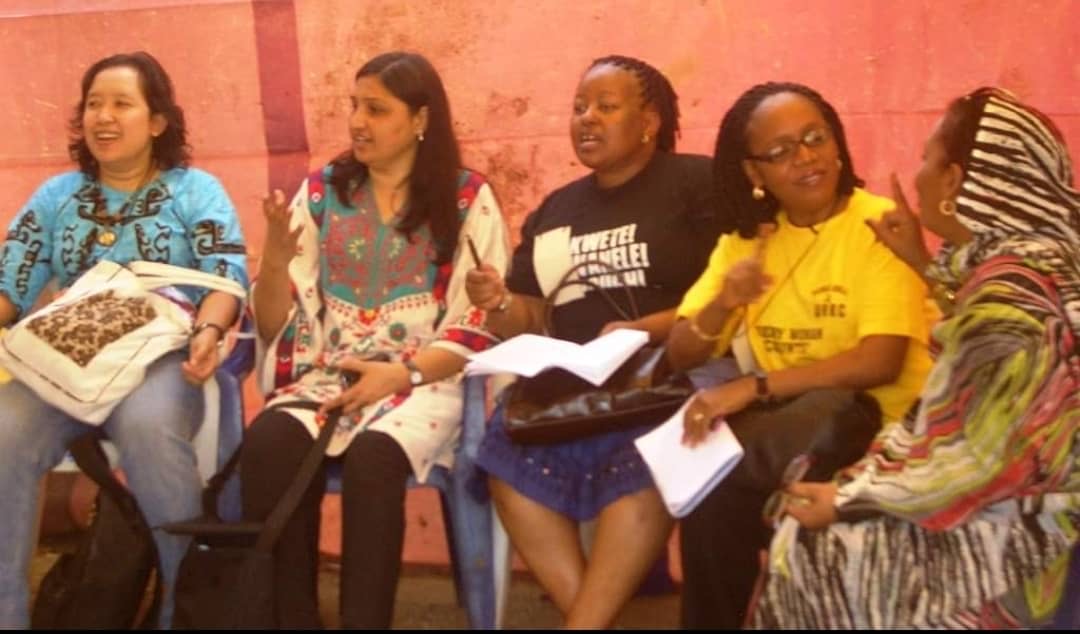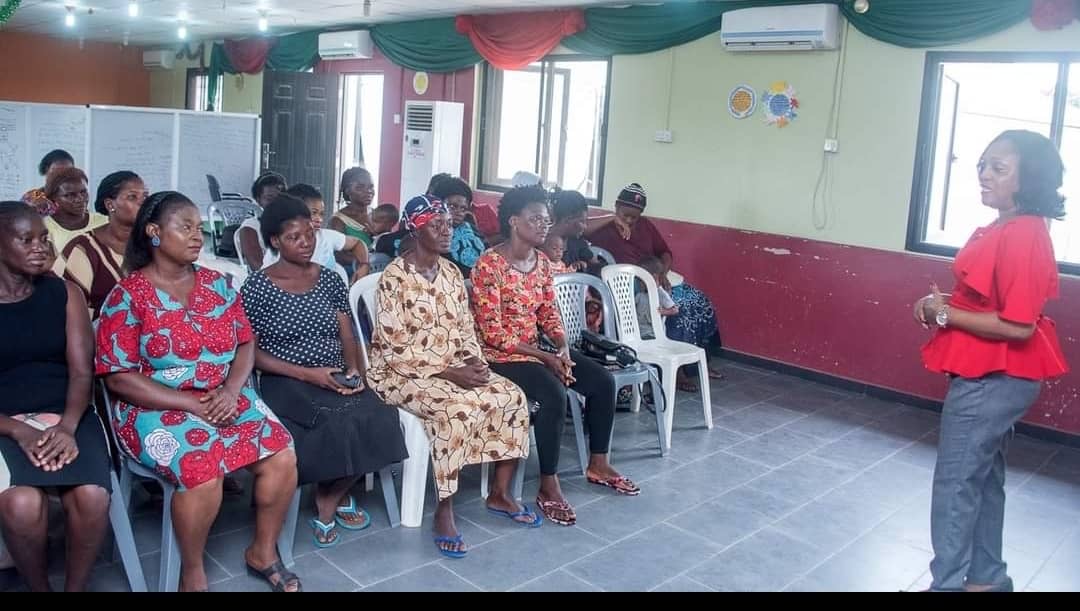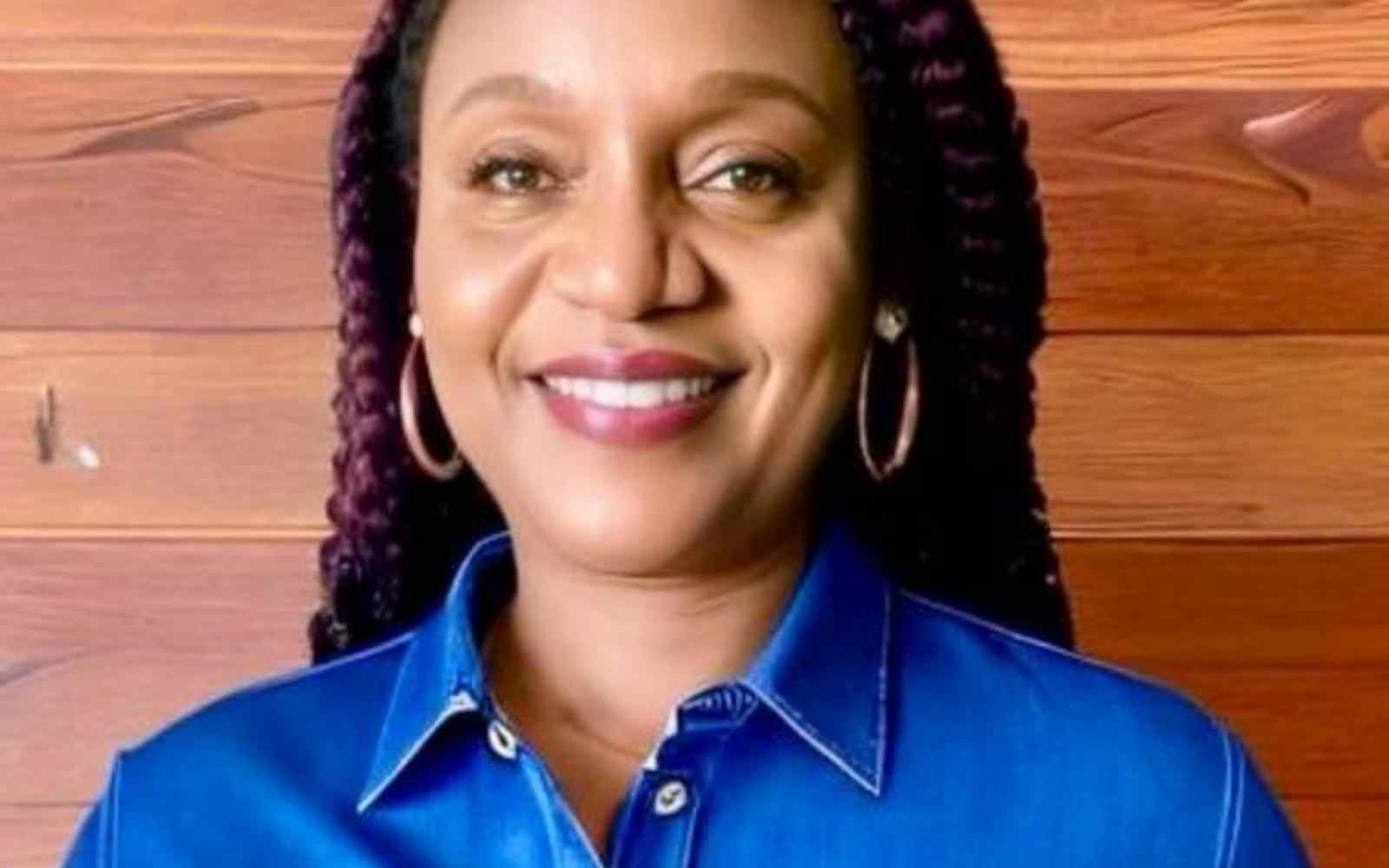Kindly Introduce Yourself
My name is Josephine Nzerem. I'm a changemaker, a mother, a changemaker maker, an Ashoka Fellow, and a staff of Ashoka and it is wonderful to be here.
How did being an Ashoka fellow shape your approach to social change? And how does it influence the work that you do today as an Ashoka staff?
Becoming a fellow was something that I consider life changing. I remember back in those days doing my work as a social entrepreneur without even knowing that's what I am, working with communities, women and military personnels. It was by the time I started going through the Ashoka process that I had a deeper understanding of who I am and what I was doing. This gave me insight to acknowledge the fact that community is important because I was now part of a community of likeminded people, and it was exciting.
Being an Ashoka fellow opened a whole lot of doors that has influenced my work. I saw my idea soar through various countries reaching people in Namibia, Ghana, Uganda, Indonesia.
Every woman needs a community. Every woman needs that support. It could be with working in human right, abuse or property rights etc. We all need support and that's one thing that influenced my work – being a part of the Ashoka Community.
How has your knowledge and experience with the importance of community helped you with building a community with Ashoka Fellows and the women you work with in general?
I'll start with building a community with fellows. When I became a fellow, I realized that one way we could draw strength was in working with other fellows and building a community where we share ideas, opportunities and resources. As fellows, we built a community around the work we were doing. We had fellows coming in for meetings and rotated the meetings to be held at the various offices of fellows.
We started asking questions like: how do we scale our work? How do we scale out of Nigeria and Africa? The community was so key to our group coming together to share ideas. We looked at policies and brainstormed ways to influence the public to be changemakers.
With looking at policies, this was a huge need for my area of work - It was important for the policy to be passed where women could inherit properties from their fathers and husbands. You can imagine our joy when that policy was passed through the work of the fellowship Community – the policy has been passed that women can now inherit after their fathers. So many cases have been won where women are now inheriting after their husbands.
Community enables you build and grow with your peers to be able to recognise what is important: Why is important to scale deep? Why is important to scale wide and why is important to scale up?

Can you share some highlights you've experienced on your journey as a changemaker and Ashoka Fellow?
I remember how we all started. You know, building that community of women changemakers and advancing in our work - one thing that stands out is the fact that we didn't leave anyone behind.
I realized that in my work I had to speak to women in the grassroots, so I had tailored engagement for women, artisan groups of women and market women. I also had tailored engagement for corporate women. Why I did that was so that no one is left behind and that produced a whole lot of result. It became more successful for women to see that they have a voice regardless of their position or status in life.
It gave me great joy when I saw market women back then coming to my office to show me how they had progressed - a woman came flagging her marriage certificate saying, ‘I'm now married legally’. It was an amazing experience.
I also partnered with certain organisations to give bursary to children of widows. This was powerful as it's always a sad experience when children drop out of school due to lack of resources because the breadwinner has passed on.
I saw women come together, whether they were in the corporate field or a market woman or an artisan; coming together in one space to begin to share about their problems and gaining insight of solutions. A woman will talk about her problem and another woman will come up with a solution and how it could be done it. It brought home to me that community is important because I saw it come alive as I saw women connect.
It wasn't about their degree or position or titles. It was just about the fact that we are all women, and we need to help one another. We need to ensure that all our voices are heard. We need to ensure that no woman is being battered and that even if a woman is being battered that she has the agency to speak up.
Also, it was important to realize that yes, we are all women, but we are also different. It's not everyone that can immediately have the boldness to speak out when there's violence going on. For some people, they need to be mentored for them to realize that that they have power, and they have a voice.
Recognizing those differences in our community was important. We carried them along and gave them that space and room to breathe, to realize who they are because it's only a woman who understands her power and has realized the fullness of who she is, can utilise her changemaking skills.
How did you navigate the transition from being an Ashoka Fellow to assuming a staff role, and what challenges or opportunities did you encounter during this process?
I don't think it was a transitioning, it was more of becoming in the sense that I'm an Ashoka fellow first. I'm a fellow for life, so it was more of becoming a staff for me. I asked myself: How do I leave the community; leave the work I've done and just focus on being a staff? It wasn't easy to make the decision.
I cannot say that I left the Community. I didn't because I realized that I didn’t need to and that's the beauty of working with Ashoka. It gives you that flexibility to continue to engage at your change making points. I would still be doing my life as fellow, but within a different organization, and that's what made it very clear for me.
When I looked at it that way, it became easier for me. Easier in the sense that the changemaking culture that I had is also the same change making culture that Ashoka has. So, there was an alignment.
It also helped me in a way because I realized that organization is not just the four walls of an office, it's more of the community and the campaign you have built. Imagine my joy many years ago when someone on social media reached out to me from Namibia after reading my story to start my idea in her country. It made me realize that ideas can be replicated wherever. It's not about the four walls of an office – It is about the tangible activities you are doing to change people's life - giving people power to positively engage their society.
Now as a staff, being a changemaker and working with a group of changemakers, it was truly exciting to interface with different people in the office to see the way we all think because everyone was thinking outside the box.
You gave people in other countries the go-ahead to implement your ideas. What advice do you have for changemakers around sharing their ideas?
It is the greatest joy of all. Imagine someone from a different country sending you a newspaper clip of what they did as they were replicating your idea and also making reference to your name. Imagine the beauty and the power. They take the idea and they replicate it in their place, but they still make reference to you.
I didn't even go out asking them to reference me. I guess the freedom in which I said, please take an idea and replicate it made them do that. So it wasn't that I set out to tell them, hey, as you're replicating this idea and make sure you reference me, make sure you recognize me. No, but it happened organically and there's beauty in knowing that something you created is not just lying with you - It is out.
That's the power that you have as a changemaker - that power to let go is the most beautiful thing of all because as you let go, the idea begins to fly against the winds. It has the potential to touch more than hundreds of people. I'd advice changemakers not to hoard but rather let go and give their ideas wings to fly.

Are there specific skills or qualities you developed during your Fellowship that you find particularly beneficial in your current role?
The power to listen. Talking is easy however, it is more powerful to be quiet and listen. Being involved with women and with fellows, when they speak, they just want you to listen. Listening is not about the intelligent advice you would give; it is about having that power to hold someone's hand and listen to their story and let them pour out. Giving them the confidence and strength that this is a safe place, and they can share their story.
Another thing is the power of telling stories. I have been able to hone my idea to tell my story and I give it as a gift to all changemakers that I come across. I have found out that telling your story is something that we must all learn because it's through storytelling that people get to know what you're doing, how beneficial it is, and what they need to do to get to where they are going.
It is stories that inspire people to change. It is stories that inspire people to act, so it's important that as changed makers we learn how to tell our story.
Another thing is building trust. Building trust is so critical to well-being. If you don't build trust with your audience, how would people feel safe to share their story with you?
Any final advice for changemakers and women in general?
My advice to change makers and women is don't micromanage people. Give them wings to fly because we can learn from mistakes. If you micromanage people, you are altering their journey negatively.
